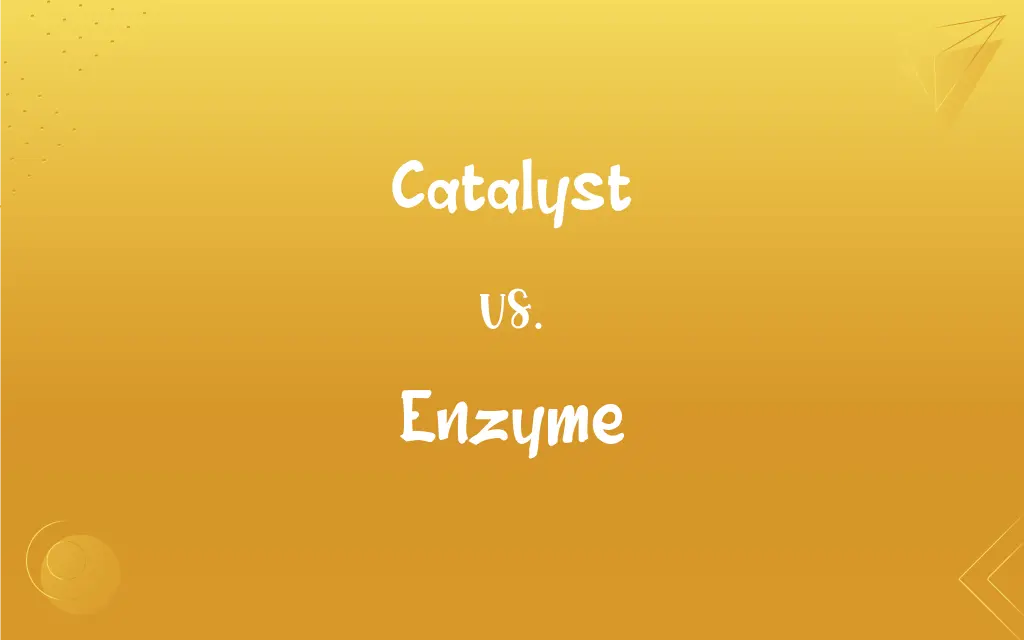Catalyst vs. Enzyme: What's the Difference?
Edited by Janet White || By Harlon Moss || Updated on October 20, 2023
A catalyst accelerates chemical reactions without being consumed; an enzyme is a biological catalyst made of proteins.

Key Differences
A catalyst is a substance that increases the rate of a chemical reaction without itself undergoing any permanent chemical change. This means it is not consumed in the reaction and can be reused. Enzymes, on the other hand, are specific types of catalysts found in living organisms. They facilitate and accelerate various biochemical reactions essential for life.
While catalysts can be inorganic or organic and are utilized in various industrial and chemical processes, enzymes are strictly organic, primarily composed of proteins. An enzyme's specificity and functionality are due to its intricate three-dimensional structure, which allows it to interact with specific molecules called substrates. A catalyst, in contrast, may work on a broader range of reactions without such molecular precision.
Both catalysts and enzymes play a pivotal role in making reactions more efficient. The key distinction is in their realms of application. Catalysts dominate the industrial and synthetic world, speeding up reactions for manufacturing, energy production, and pollution control. Enzymes rule the biological domain, ensuring metabolic processes occur at rates suitable for life.
The sensitivity of enzymes is notable. Their activity can be influenced by factors such as temperature, pH, and the presence of inhibitors. While many catalysts are also sensitive to specific conditions, enzymes, given their biological nature, often have narrower optimal conditions. Catalysts, being more diverse, might be metals, ceramics, or even other organic compounds, each with its unique set of operational conditions.
It's worth noting that while all enzymes are catalysts, not all catalysts are enzymes. The term "catalyst" encompasses a broader array of substances, while "enzyme" refers specifically to those catalysts that operate within the realm of biology.
ADVERTISEMENT
Comparison Chart
Definition
Substance that accelerates chemical reactions
Biological catalyst made of proteins
Nature
Can be inorganic or organic
Strictly organic (protein-based)
Specificity
Can be general or specific
Highly specific to its substrate
Domain of Action
Found in industrial/chemical processes
Found in biological processes within organisms
Sensitivity
Varied sensitivity to conditions
Sensitive to temperature, pH, inhibitors, etc.
ADVERTISEMENT
Catalyst and Enzyme Definitions
Catalyst
A substance that speeds up reactions.
The platinum in car exhaust systems acts as a catalyst.
Enzyme
A protein that catalyzes biochemical reactions.
Lactase enzyme breaks down lactose in milk.
Catalyst
A facilitator for transformation in substances.
In the experiment, the catalyst lowered the activation energy.
Enzyme
A biological molecule promoting specific reactions.
The enzyme attached to its substrate, initiating the reaction.
Catalyst
An agent that prompts change without being altered.
The announcement was the catalyst for the stock market surge.
Enzyme
A specific activator in cellular reactions.
The presence of the enzyme ensured the digestion of fats.
Catalyst
An accelerator for chemical processes.
The research team sought a new catalyst for the synthesis.
Enzyme
An organic catalyst in living beings.
Without the enzyme, the metabolic process would be too slow.
Catalyst
A compound that isn't consumed in the reaction.
Using a catalyst ensures the production process is cost-effective.
Enzyme
A facilitator for transformations in organisms.
The plant enzyme aided in converting sunlight to energy.
Catalyst
(Chemistry) A substance, usually used in small amounts relative to the reactants, that modifies and increases the rate of a reaction without being consumed in the process.
Enzyme
(Christianity) leavened bread, as opposed to azyme
Catalyst
One that precipitates a process or event, especially without being involved in or changed by the consequences
"A free press ... has remained ... a vital catalyst to an informed and responsible electorate" (Robert O'Neal).
Enzyme
A protein produced by a living organism, capable of catalyzing a chemical reaction. Almost all processes in living organisms require some form of enzyme to cause the reactions to occur at a rate sufficient to support life. There are a very wide variety of enzymes, each specifically catalyzing a different chemical reaction, the sum of which cause the bulk of the physiological changes observed as life processes. Enzymes, like most proteins, are synthesized by the protein-synthetic mechanism of the living cell, at special sites on ribosomes, using the genetic information in messenger RNA transcribed from the genetic instructions stored as nuleotide sequences in the DNA (or in some viruses, the RNA) of the genome. Some examples of enzymes are: pepsin, diastase, rennet, DNA polymerase, invertase, glucose oxidase, protease, and ribonuclease. There are many other types of enzyme.
Enzyme
Any of several complex proteins that are produced by cells and act as catalysts in specific biochemical reactions
FAQs
Are there inorganic catalysts?
Yes, many industrial catalysts are inorganic.
Can catalysts be harmful?
Some catalysts can be toxic or reactive and must be handled with care.
Are there inhibitors for enzymes?
Yes, inhibitors can reduce or halt enzyme activity.
Are all enzymes catalysts?
Yes, all enzymes are catalysts, but not all catalysts are enzymes.
Can catalysts be reused?
Yes, catalysts are not consumed in reactions and can be reused.
Can enzymes be denatured?
Yes, enzymes can lose their structure and function under extreme conditions.
Can we artificially produce enzymes?
Yes, enzymes can be produced through recombinant DNA technology.
Can enzymes be used outside the body?
Yes, enzymes are used in industries like brewing, baking, and detergent manufacturing.
Do all reactions need catalysts?
No, but catalysts can make reactions faster or more efficient.
Do enzymes work on all reactions?
No, enzymes are highly specific to particular reactions or substrates.
Are enzymes only found in animals?
No, enzymes are found in all living organisms, including plants and microorganisms.
Do catalysts change the reaction's end products?
No, catalysts only speed up reactions; they don't change the final outcome.
Can we recover catalysts after a reaction?
Often, yes. Many industrial processes recycle and reuse catalysts.
How are enzymes named?
Enzymes are often named for their substrate with the suffix "-ase" (e.g., lactase).
Can a substance act as both an enzyme and a non-enzymatic catalyst?
While enzymes are catalysts, they function within biological contexts; outside that, they wouldn't act as typical industrial or chemical catalysts.
What can affect enzyme activity?
Temperature, pH, inhibitors, and substrate concentration can influence enzyme activity.
Why are catalysts important in industry?
Catalysts increase reaction rates, making processes faster and more economical.
What's an enzyme's active site?
It's the region on an enzyme where the substrate binds and the reaction occurs.
Are enzymes sensitive to temperature changes?
Yes, enzymes have optimal temperatures; too high or low can reduce their activity.
How do catalysts speed up reactions?
Catalysts lower the activation energy required for a reaction to proceed.
About Author
Written by
Harlon MossHarlon is a seasoned quality moderator and accomplished content writer for Difference Wiki. An alumnus of the prestigious University of California, he earned his degree in Computer Science. Leveraging his academic background, Harlon brings a meticulous and informed perspective to his work, ensuring content accuracy and excellence.
Edited by
Janet WhiteJanet White has been an esteemed writer and blogger for Difference Wiki. Holding a Master's degree in Science and Medical Journalism from the prestigious Boston University, she has consistently demonstrated her expertise and passion for her field. When she's not immersed in her work, Janet relishes her time exercising, delving into a good book, and cherishing moments with friends and family.
































































